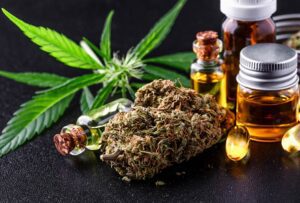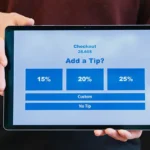by Linda L. Esterson, photography by Nikola Tzenov
Carroll’s Bud Boom: Legalized Cannabis has Local Dispensaries Riding High
Like many in his generation, 66-year-old Westminster resident Bobby Anderson smoked marijuana when he was young. At the time dispensaries opened several years ago, he had gone 40 years without smoking. Anderson was granted a medical card for legal marijuana purchase to combat a respiratory condition and help him sleep.
Anderson bought marijuana to smoke and found that the effects were “almost instant.” It helped his body relax and improved his breathing. Ultimately, smoking proved harmful based on his condition, and after about 10 months, he turned to edible products manufactured with cannabis.
After the purchase of cannabis products for recreational use became legal in Maryland on July 1, 2023, Anderson let his medical card lapse. It initially cost him approximately $150 — $50 for the registration fee, plus a doctor’s certifying visit granting medical necessity. (Maryland reduced the fee to $25 on Oct. 1, 2022.) Without a card, he pays a 9% tax on the purchase. Medical card holders don’t pay the tax and have access to some products with higher strengths.
Anderson’s product of choice is an Encore Pomegranate Punch edible, and he eats half of the chewable gummy to help him fall asleep. The gummy — a 10-mg combined dose of delta-9-tetrahydrocannabinol (THC) and cannabinol (CBN) — takes up to two hours to take effect, he said.
Anderson also likes Bedtime Betty’s by Betty’s Eddies, a flavored fruit chew blended with CBN, CBD (cannabidiol) and THC, designed as a sleep aid. Anderson visits his local dispensary every three weeks to stock up, buying a 10-pack of 10-mg gummies for $20 after the 20% senior citizen discount. “There’s so much great information about the various strains and what to use for different maladies,” he said. “I applaud it. I think that it’s long overdue.”
[divider style=”single” border=”small”]
A Growing Recreational Market
Since Maryland legalized recreational, also called adult-use, marijuana, sales have skyrocketed. According to the Maryland Cannabis Administration, adult-use sales in Maryland totaled more than $3.5 million on July 1 alone, as compared to medical-use marijuana, which totaled $959,000. July saw $51 million in adult-use sales and $36 million for medical-use sales. At press time, sales figures were available through November and showed a steady increase in adult-use and a slight decline for medical-use marijuana. In November, retail sales were nearly $56 million for adult-use and $33.6 million for medical-use marijuana.
The third quarter tax report released by the Comptroller of Maryland indicated the state collected more than $12 million in sales tax from adult-use sales. In the central region — including Carroll County, Baltimore City and Baltimore, Anne Arundel, Howard and Harford counties — the state collected nearly $5.5 million for the quarter which includes sales from July, August and September 2023. A Maryland Cannabis Administration public information request response indicated that data was not available by county.
In Carroll, two licensed dispensaries opened their doors to large crowds upon the legalization of cannabis for recreational use.
“On day one, there was an undeniable sense of excitement and anticipation in the air as customers lined up to experience this new era of legalized adult-use sales,” noted Jordan Bryant, director of marketing for PharmaCann, the parent company of Verilife medical and recreational marijuana dispensaries, including the location on Corporate Center Court off Route 97 in Westminster. “Since then, we have witnessed significant growth and evolution in the market. The demand has continued to surge.”
At The Dispensary, in the 140 Village Shopping Center in Westminster, the number of customers nearly tripled after legalization, according to David Werner, general manager. As of early December 2023, traffic remained steady while the average recreational sale dipped slightly, as customers stocked up or used more randomly than medical card holders, Werner said.
“We never expected this many people in our tiny little building,” he said. “When we first started, a typical Friday was 60 people. Now a slow Friday is 600.”
In the initial days, consumers explored and experimented with the newfound accessibility, Bryant noted, while today, they are more informed and discerning. Many customers are familiar — they shop regularly — and many come south from Pennsylvania, where the purchase of cannabis is legal only with a medical card, Werner said.
How to Buy

Maryland law requires proof of legal age — 21 years old — to enter a dispensary. Buyers enter the check-in area at both county dispensaries and present a driver’s license and a medical use card if applicable. Dispensary staff scan the identification to ensure the individual is of legal age and that the license is valid. If the license is expired, unscannable or the photo does not match the individual presenting it, staff deny access to the dispensary. Customers can shop anonymously, and their identification is examined manually. They receive a six-digit number to use instead of shopping by name.
Once inside Verilife, customers can head straight to a kiosk to place an order or connect with a budtender on the floor who can recommend products and answer questions. The Dispensary does not provide kiosks; customers consult the budtender for help with products and making purchases. Both dispensaries offer loyalty programs, with customers creating accounts to generate discounts and online ordering for pickup.
The dispensaries see customers of all ages, with those older than 60 trying products recreationally as they retire. According to Werner, the most significant demographic increase is the 35- to 45-year-old male, with more purchasing anonymously.
Customers have daily purchase limits set by the Cannabis Reform Act of 2023 for recreational use. Those ages 21 and older are permitted to possess up to 1.5 ounces of cannabis flower (plant form including joints and pre-rolls), 12 grams of concentrated cannabis (vape products) or a total amount of edible cannabis products that do not exceed 750 mg of THC. The certifying provider specifies more substantial limits for medical card holders, which are tracked on a rolling 30-day basis. Each purchase is monitored to ensure limits are not exceeded, including those by customers choosing to be anonymous.
So Many Choices
Verilife’s menu features more than 200 products for medical use and 125 on its recreational menu. At The Dispensary, there could be as many as 700 items on the floor at any time. What products does a dispensary stock?
Concentrates Pressed flowers yield liquid formed into different consistencies. This liquid can be mixed into drinks, solidified to form a crumble or shatter that is smoked by dabbing with a torch, or made into sugar, butter or oil used for baking.
Edibles The manufactured product appears as gummies, taffies, baked goods like brownie bites, cookies and candies.
Flower options Buds are cut off the plant. Pre-ground flower is sold as “shake” or pre-rolled, ground shake rolled into a paper cone.
Topicals Creams and lotions are sold for pain relief.
Vapes (electronic cigarettes) Battery-operated devices permit inhaling vapor that contains cannabis. Cartridges come in a variety of strengths and flavors.
The most popular items are vapes and pre-rolls. The challenge, according to Werner, is keeping up with demand.
“The biggest difference is how fast everything sells,” he said. “Some products sell out in a day or a week and at most a month. It used to be that we’d have some products out there for six or seven months.”

Concerns Remain
As much as legalization has helped users and boosted the economy, challenges continue.
According to Sharon Boston, director of public relations at LifeBridge Health, Carroll Hospital has seen a slight uptick of individuals with cannabis-related diagnoses in the months leading up to and after the legalization of marijuana in July 2023. LifeBridge Health is the regional health system that includes Carroll Hospital in Westminster.
Carroll County Sheriff James DeWees said it’s too early to evaluate the true impact of marijuana legalization on the county. He does acknowledge, via email communication, “a moderate uptick locally in issues, specifically individuals driving under the influence.”
However, testing impaired drivers under the influence of marijuana and other illicit drugs presents a significant challenge to law enforcement, he explained. Impairment resulting from alcohol use is verified quickly with a Breathalyzer test and a numerical reading that indicates intoxication above the legal limit.
“Those tests exist, and it’s pretty quick to determine the level of alcohol consumption,” DeWees said. “We can process a DUI in about an hour or so; conversely, someone under the influence of marijuana or another substance could take hours.”
During a traffic stop, the driver suspected of being under the influence of marijuana or other substances is asked to perform field sobriety exercises similar to those used during a stop related to alcohol use. If determined to be under the influence, the driver is arrested and transported to the Carroll County Sheriff’s Office for additional testing and a breath test. Additionally, law enforcement performs 11 additional steps to determine the substance causing impairment by a drug recognition expert (DRE), an experienced deputy who has undergone extensive training. There are only four of these experts in the county at this time.
State regulations in place for growing, manufacturing and selling cannabis products aim to improve safety for users. However, there is still a black market for the drug, which can lead to marijuana mixed with other dangerous substances.
“Unregulated marijuana can include a number of harmful substances, including fentanyl and xylazine,” Boston said in an email statement. “The hospital’s peer recovery team encourages adults who choose to purchase marijuana to do so from a legitimate dispensary.”
[divider style=”single” border=”small”]
Glossary of Terms
Cannabis The scientific name for the marijuana plant, Cannabis sativa L., and any part of the plant, including all derivatives, extracts, cannabinoids, isomers, acids, salts and salts of isomers with a delta-9-tetrahydrocannabinol (THC) concentration greater than 0.3% on a dry weight basis.
Cannabidiol (CBD) Cannabidiol is a non-psychoactive phytocannabinoid derived from hemp and used for pain relief, insomnia and anxiety.
Cannabinol (CBN) Cannabinol is a natural compound found in the cannabis plant that provides a mild high, delivering healing properties.
Cannabis Indica This shorter, thicker Cannabis species provides more mellow, relaxing effects.
Cannabis Sativa This lighter-colored Cannabis species is said to provide more uplifting effects.
Hemp Hemp has a delta-9-tetrahydrocannabinol concentration that does not exceed 0.3% on a dry weight basis.
Hybrid Hybrid is a mix of Cannabis indica and Cannabis sativa (see above).
Marijuana Also referred to as weed, pot, grass, dope, reefer, ganja, hash, herb or Mary Jane, marijuana is the mixture of the dried flowers of the Cannabis sativa plant.
THC Delta-9-tetrahydrocannabinol is the main psychoactive ingredient in the Cannabis sativa plant.
Compiled with information from the Comptroller of Maryland, National Institutes of Health, Verilife and MarijuanaDoctors.com
[/vc_column_text][/vc_column][/vc_row]













